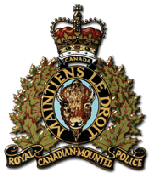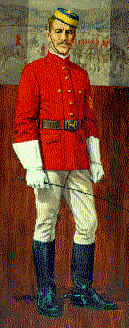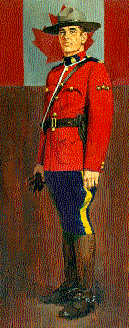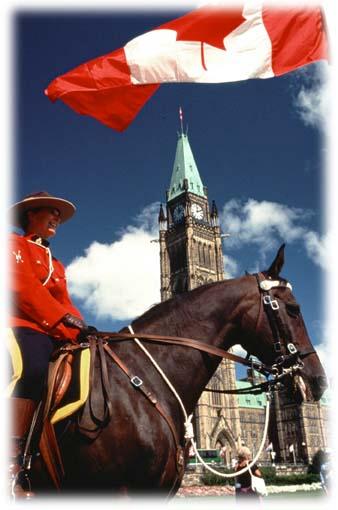
Royal Canadian Mounted Police History
| The North-West Mounted Police was established in 1873 by the Canadian Government to police the vast areas of western Canada that today comprises the provinces of Saskatchewan and Alberta. Reports reaching the government indicated that some form of control was needed as free traders roamed at will in the sordid enterprise of exchanging alcohol for valuable furs, robes and horses. News from Cypress Hills that a gang of white wolf hunters had massacred a camp of Assiniboine Indians precipitated the formation of the North-West Mounted Police. Assembling at Dufferin, Manitoba, in the summer of 1874, the force, some 300 strong, set out on the long march to the Rocky Mountain foothills in search of the whisky forts, and traders. In October of that year, Fort Macleod was built on the banks of the Oldman River, in present day Alberta. By 1875, additional posts at Fort Saskatchewan, Fort Calgary and Fort Walsh had been established. In 1882, the Force's headquarters was transferred from Fort Walsh to Regina where it remained for 38 years. |  |
 |
By patient negotiation the NWMP established friendly relations with the Indians, wiped out the illicit whisky traffic and suppressed the lawlessness that had flourished in the region. The North-West Mounted Police assisted the militia in quelling the 1885 North-West Rebellion, and shouldered countless new duties brought about by the vast influx of settlers that flocked to the plains after the cessation of hostilities. In 1898, word of gold discoveries in the Yukon brought hordes of largely ill-equipped fortune hunters to the region and to the North-West Mounted Police fell the task of maintaining law and order. In 1904, King Edward VII granted the Force use of the prefix "Royal" and it became the Royal North-West Mounted Police. The year 1920 saw the Force absorb the Dominion Police, Headquarters transfer from Regina to Ottawa and its title changed to Royal Canadian Mounted Police. In the same year the Force was charged with enforcing federal legislation throughout the entire country. In 1928, by means of a contract between the RCMP, the federal government and the province of Saskatchewan, the Force undertook provincial police duties in that province. Similar contracts were made in 1932 with the remaining prairie provinces and the Maritimes. In that year the RCMP also absorbed the Preventive Service of the Department of National Revenue. |
 |
 |
During World War II the Force was responsible for maintaining Canada's internal security and also from its ranks recruited No. 1 Provost Company, Canadian Army, which saw service on the battlefields of Europe. During this period the Force's small Arctic supply vessel "St. Roch" was adding a chapter to Canadian history. Between 1940 and 1942, St. Roch successfully completed a voyage through the fabled Northwest Passage from Vancouver to Halifax, becoming the first ship to traverse the Passage from west to east. The ship made a return journey in 1944 and later, in 1950, sailed from Vancouver to Halifax via the Panama Canal to become the first vessel to circumnavigate the North American continent. In the same year the RCMP assumed provincial policing duties in British Columbia and undertook enforcement of federal and provincial legislation in the newly formed province of Newfoundland. The Force headed by a Commissioner, is organized under the authority of the RCMP Act. Under the Solicitor-General of Canada's direction, the Commissioner controls and manages the Force's operations from its Headquarters in Ottawa. The Force consists of thirteen operation divisions, alphabetically designated, with a headquarters for each generally located in provincial or territorial capitals. The operational divisions are further divided into 52 sub-divisions and 723 detachments. Air and Marine Services within the Force support the operation divisions. The RCMP Training Academy is situated in Regina, Saskatchewan. The Canadian Police College, and the Musical Ride are all located at the RCMP's Rockliffe facilities in Ottawa. (taken from brochure published 1991 by RCMP Public Affairs Directorate) |
Published on: 2004-08-05 (20519 reads)
Recent Reviews
- War Horse 2012-01-02
- Legion 2010-01-23
- Zombieland 2009-10-02
- The Martyr's Oath: The Apprenticeship of a Homegrown Terrorist 2009-08-20
- Bachman Cummings 2009-06-22
- Star Trek 2009-05-03
- X-Me Origins: Wolverine 2009-05-01
- Soloist 2009-04-24


